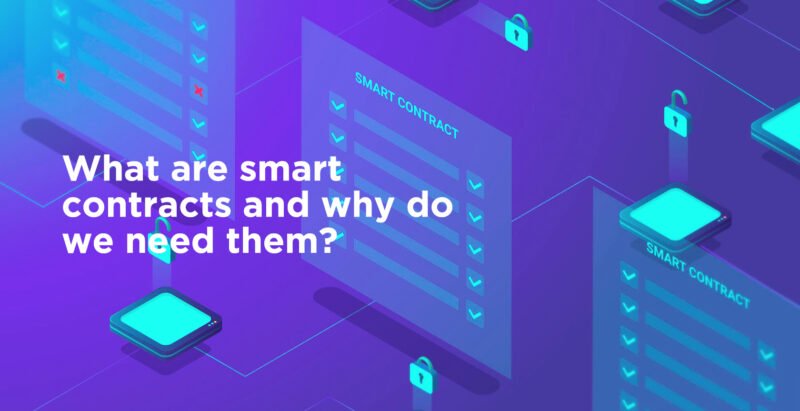Smart contracts are a new technology that can improve efficiency across a variety of industries. The smart contract market is expected to reach 300 million dollars by 2023 with a 32% CAGR. In this article, you will learn what smart contracts are, how they work and where they can be applied.
What are smart contracts
We are all familiar with apps and app stores. You go to the AppStore or Google Store, browse, find and download the desired application.
In addition to beautiful UX and UI interfaces, these apps perform a specific set of steps in a pre-built algorithm. Your in-game clicks, dragging and dropping events and activities in the calendar, or checking favorite products and moving them to the shopping cart.
It could be a game, a calendar, or a way to buy goods and services.
Smart contracts perform a very similar function. The main difference is that they can eliminate the need for an intermediary when two parties want to exchange valuable digital or physical assets.
These are blockchain applications based on a decentralized immutable public ledger. Smart contracts can be created on platforms like Ethereum Virtual Machine or Solidify.
Smart contracts record contracts in the form of computer code that contains the terms of the contract. When all conditions are met, the contract is activated.
The goal of a smart contract is to ensure the security of a transaction and reduce surplus transaction costs. It saves time, decreases the possibility of conflicts, and is a cheaper, faster, and safer way to pay compared to the traditional system.
Vitaly Buterin, the founder of Ethereum, believes this is the future of blockchain. “If Bitcoin is the gold of the business world, then smart contracts are the oil that powers the business world.”
How smart contracts work
Let’s say you want to buy a car online without a smart contract. To do this, you need:
- A website containing information about all the cars that you would like to see.
- A messenger or email to communicate with sellers.
- A payment system that allows you to exchange money after you have found your car.
- An opportunity to get a refund if the car turns out to be defective.
- It is also necessary to register the exchange of ownership of the car with the authorities.
Each of these steps requires you to trust the website or service you are using, — and most of the time, each part of this process is controlled by another company or individual. An intruder or third party can intervene at any time and change any of the above, invalidating the entire transaction.
Smart contracts eliminate the need to trust so many people in the buying process. The principle of smart contracts can be described in five steps:
I. Offer. The transaction process begins with a proposal from a first party. The first party writes down their conditions in the form of an “if-then” statement and then puts it on the blockchain.
II. Negotiations. During negotiations, the terms of the contract are visible to each party in the blockchain.
III. Statement. Once the two parties agree on the terms of the contract and the events that trigger it (for example, due date, expiration date, price, or other terms), the contract becomes unchanged and cannot be changed by either party.
IV. Satisfactory conditions. After each party approves the contract, smart contracts can independently match the terms that are placed inside the contract code by interpreting the data in real-time.
V. Transaction. As soon as all conditions are verified, a triggering event happens, and the transfer of the approved assets takes place. The assets, in this case, can be stocks, real estate, information, intellectual property, and digital / non-digital media.


Application of smart contracts in business
The number of ways this technology can be used is, in fact, very large. For example, smart contracts can be used in the field of logistics, helping to solve the problems of bureaucracy so common in this field. Smart contracts can also identify those responsible for car accidents, making it easier for insurance companies to determine their premiums.
Let’s take a look at modern examples of industry use cases of smart contracts by companies.
Business management. Companies can greatly benefit from the implementation of this technology. Instead of paying employees to maintain payroll, they can use smart contracts. For example, a company creates a smart contract in which it states that when a certain date of each month comes, 2 ETH is sent from the business account to John. This means that John will always be paid on time and will never be underpaid. The business wins because everything is automated, which saves time and money.
Insurance. AXA has launched an insurance product Fizzy, which uses smart contract technology to handle flight delay insurance claims. A smart contract connects to global air traffic databases, so the payment is automatically initiated if the delay exceeds two hours.
Clinical trials. Encrypgen uses smart contracts to transfer patient DNA data to researchers for clinical trials. Using genomic data, researchers are finding more effective treatments for diseases. This blockchain solution combines DNA and payment data into a single blockchain system, making it easier to access research data.
Real estate. Smart contracts can speed up real estate sales and purchases. For example, as soon as a buyer makes a payment to the seller, a smart contract can automatically change the owner of the asset based on the payment information on the blockchain. Prophy allowed the world’s first real estate transaction using smart contracts in 2017. Their first transaction was a 60,000-dollar apartment in Ukraine.
Gaming industry. For example, CryptoKitties is a game built on blockchain technology. This is a demonstration of how people can store and exchange digital items on the Ethereum network. Users can buy and sell cats using Ether tokens. Since CryptoKitties are stored on the blockchain, even if the company closes the application or blocks your account, you can still have your CryptoKitties.
Data market. For example, the Datapace and Ocean Protocol platforms, where users purchase data flow through an automated smart contract.
Summary
The popularization of smart contract technology will help reduce fraud, delays, and the total cost of many services and goods.
And if smart contracts do the job and become more popular in most business processes, perhaps one day we will live in a world free of intermediaries. And the best thing about no intermediaries is that it allows saving a lot of money.



















